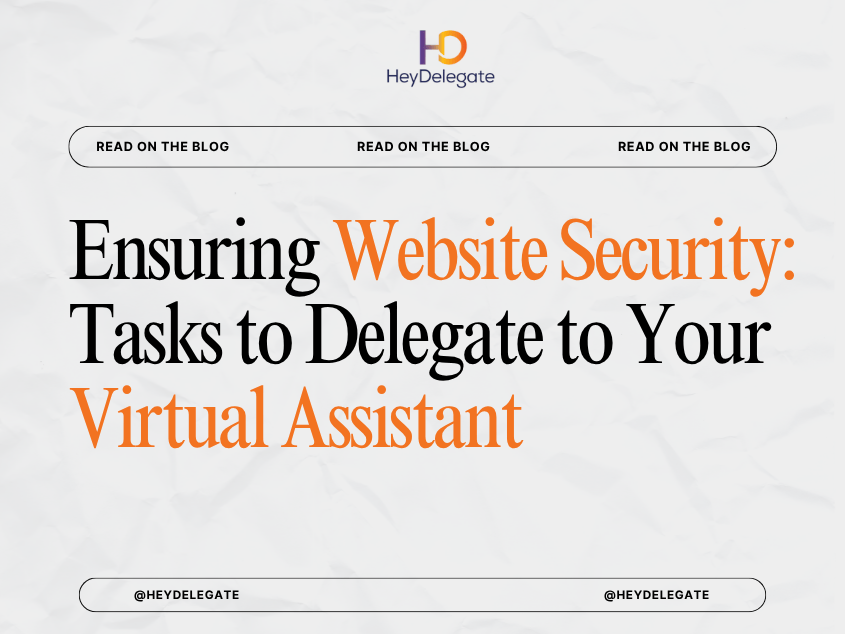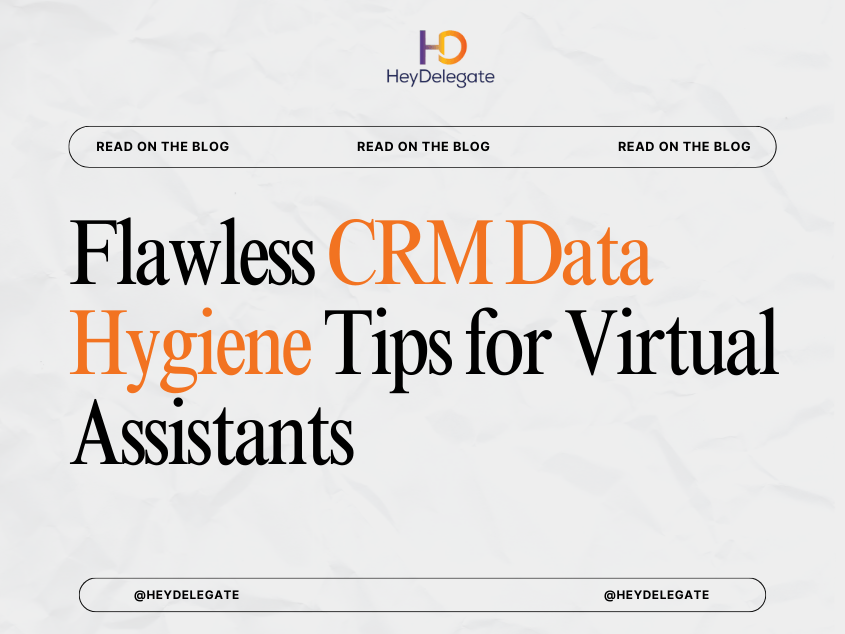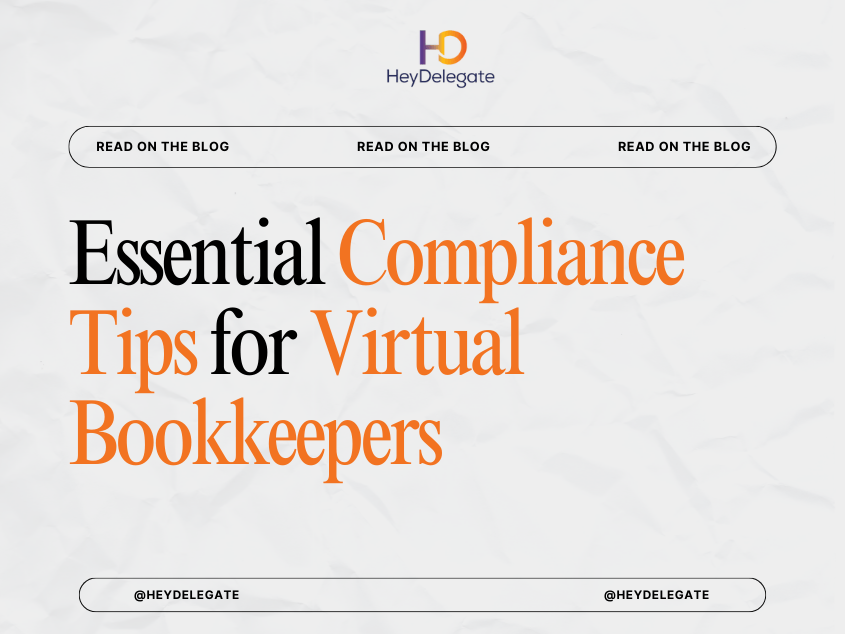In an age where your website is more than just an online business card, it’s your brand, storefront, and communication hub, security is no longer optional. Cyber threats are evolving rapidly, and even small businesses are not immune. Thankfully, maintaining a secure website doesn’t mean you need to become a cybersecurity expert overnight. With the right guidance and tools, a Virtual Assistant (VA) can take on many of the day-to-day tasks that keep your website secure.
This blog explores the key website security responsibilities you can delegate to a Virtual Assistant to protect your digital assets, build customer trust, and ensure uninterrupted online performance.
Why Website Security Matters for Every Business
Cybersecurity isn’t just a concern for tech giants. Small and medium businesses are frequent targets because they often have fewer resources and weaker defenses. One security breach can:
- Damage your brand reputation
- Expose sensitive customer data
- Result in financial loss
- Lead to costly downtime or site blacklisting
Proactively securing your website is a smart investment, and a VA trained in security protocols can help you do it consistently.
1. Regular Plugin, Theme, and Core Updates
Outdated plugins and CMS versions are among the most common causes of website vulnerabilities.
Your VA can:
- Monitor updates for WordPress (or your CMS platform)
- Apply plugin and theme updates weekly
- Test functionality after updates to prevent conflicts
- Remove unused or abandoned plugins that pose a risk
By keeping your website ecosystem current, your VA significantly reduces the chance of exploitation.
2. Backups and Recovery Setup
Backups are your lifeline in case of a cyberattack, data loss, or plugin conflict.
A Virtual Assistant can:
- Schedule daily or weekly automated backups
- Store backups on secure cloud platforms (Google Drive, Dropbox, AWS)
- Perform test restores to ensure backups work
- Maintain a log of backup versions and changes
With consistent backups, you can recover quickly from even the worst-case scenario.
3. User Role and Permission Management
One of the easiest ways hackers gain access is through compromised or excessive user permissions.
Your VA can:
- Review and adjust user roles regularly
- Revoke access for former team members or contractors
- Enforce strong password policies and periodic password changes
- Set up two-factor authentication (2FA) for admin-level users
Proper access control reduces the risk of internal and external breaches.
4. Security Plugin Monitoring and Configuration
Security plugins like Wordfence, iThemes Security, or Sucuri offer valuable protection, but they require active monitoring.
A VA can:
- Install and configure the right plugin based on your needs
- Monitor security logs and block suspicious IP addresses
- Set up firewalls and brute force protection
- Configure email alerts for unusual activity
With the right plugin support, your VA can help create a powerful defense system.
5. SSL Certificate Management
An SSL certificate encrypts data between your site and its visitors. Without it, your site may be labeled as “Not Secure.”
Your VA can:
- Ensure your SSL certificate is installed and active
- Renew SSL certificates before expiry
- Redirect HTTP to HTTPS site-wide
- Use tools like SSL Labs to test and troubleshoot issues
SSL support boosts trust, SEO rankings, and data protection.
6. Monitoring Downtime and Uptime
Downtime can signal a larger issue, like a hacking attempt or server overload.
A Virtual Assistant can:
- Set up website monitoring tools like Uptime Robot or Pingdom
- Receive alerts when your website goes down
- Investigate potential causes and notify your developer or host
- Document outages and resolutions
Prompt action reduces downtime and maintains your online presence.
7. Spam Protection and Comment Moderation
Spam comments can not only clutter your site but also contain malicious links.
Your VA can:
- Install and manage anti-spam plugins like Akismet or CleanTalk
- Moderate comments daily or weekly
- Block repeat spam IP addresses
- Disable comments on vulnerable pages if needed
Proactive moderation keeps your site clean and credible.
8. Website Audit and Security Checklists
Routine audits help you identify potential vulnerabilities before they’re exploited.
Your VA can:
- Use checklists to perform monthly security audits
- Check for outdated software, inactive users, or misconfigured settings
- Scan for malware using tools like Sucuri SiteCheck
- Report findings and suggest improvements
A structured audit process builds a security-first culture within your business.
9. Secure Hosting and Domain Management Support
Hosting and domain issues are often overlooked but are critical to security.
A VA can:
- Keep hosting credentials secure and updated
- Review hosting logs and suspicious server activity
- Ensure DNS settings are configured properly
- Enable domain privacy to protect WHOIS information
These tasks minimize the risk of unauthorized access at the infrastructure level.
10. Creating Security SOPs and Logs
Standard operating procedures (SOPs) help maintain consistency and compliance.
A VA can:
- Document each security task, process, and policy
- Maintain logs of updates, audits, and access changes
- Keep a record of plugin changes and website issues
- Share SOPs with new team members for onboarding
This knowledge base ensures your team remains aligned and prepared.

Tools That Empower Your VA to Handle Website Security
Equip your VA with the right set of tools:
- Security Plugins: Wordfence, Sucuri, iThemes Security
- Backup Tools: UpdraftPlus, BlogVault, Jetpack
- Monitoring: Uptime Robot, Pingdom
- Password Managers: LastPass, Bitwarden
- Audit Tools: Google Search Console, SSL Labs, Sucuri SiteCheck
Training your VA to use these tools effectively is an investment in your website’s long-term security.
Real-World Example: How a VA Prevented a WordPress Security Breach
A small digital agency running a WooCommerce-based website once experienced a sudden traffic spike followed by unusual login attempts. The VA:
- Blocked IPs using Wordfence firewall rules
- Enabled 2FA on all admin accounts
- Updated vulnerable plugins
- Backed up the site and restored clean versions of affected pages
Thanks to quick action, no data was lost and the website remained operational. This is the power of proactive VA-led security.
Final Thoughts
Website security is not a one-time task, it’s an ongoing commitment. By delegating key security responsibilities to a trained Virtual Assistant, you strengthen your digital defenses without stretching your time or resources.
Your website is one of your business’s most valuable assets. Protect it proactively, consistently, and smartly, with the help of a capable VA.
Looking to hire a VA who can manage your website security?
Let HeyDelegate connect you with a skilled assistant trained in the tools and tasks that keep your site safe and sound.




